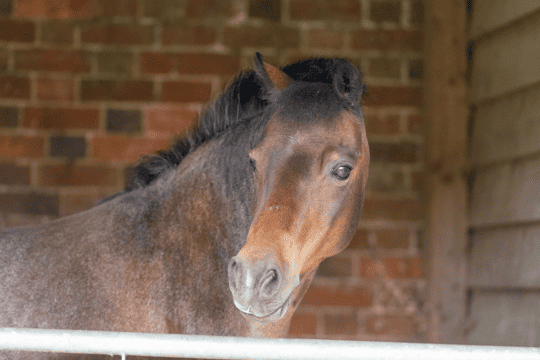
Latest News
Care for your golden oldie

Look after your senior pony with a little help from science and Spillers
Spillers’ latest research has helped scientists have a better understanding of pars pituitary intermedia dysfunction (PPID) – also known as Cushing’s – which commonly affects older ponies. With more knowledge comes the ability to provide better care for older ponies, which will help them feel and perform at their best well into old age.
Here are five super-interesting conclusions drawn from the latest research that you can apply when caring for your own pony…
- Short journeys may cause stress
We already know that ponies can get stressed out on long journeys – and they can even affect immune system function – but could short journeys affect your veteran, too? The research showed that travelling for 1.5–2 hours can have the same effects as longer journeys. More research is needed, but it suggests that you should avoid travelling older ponies for more than an hour and a half.
- Age doesn’t seem to affect nutrient digestion when fed in correct quantities
In 2014, Spillers found that healthy senior horses had no change in their ability to digest energy, protein and fibre – regardless of their diet! Recently, similar findings have been found in ponies, too. This means that as long as you feed your veteran the correct amount of all the essential nutrients he needs, he’s sure to make good use of them.
- They’re more sensitive to dietary changes
As horses age, the range of hindgut microbes – the things that help digestion happen – reduces, so they become more sensitive to changes in their diet. However, a new study was carried out in similar aged ponies and found that there was no reduction in diversity. This might mean that ponies ‘age later’ than horses – how interesting!
- Restricting the starch and sugar in their diet could be a good thing
Horses and ponies who are prone to laminitis or have Cushing’s usually struggle to regulate their insulin levels, especially if they’re fed meals that’re high in starch and sugar. Two recent studies showed that even healthy senior horses typically have an increased insulin response when fed high-starch and -sugar meals. This means it’s beneficial for all golden oldies to have minimal starch and sugar in their diets.
- A high-starch diet may lead to a false diagnosis of Cushing’s
Blood tests are used to diagnose Cushing’s. The test measures the level of the adrenocorticotropic hormone (ACTH), but it can be tricky because the level can be affected by several factors – for example, time of year and ageing itself. However, research has shown that high starch diets can also increase the level of ACTH, which might cause a misdiagnosis!
Take home message
If you own a senior pony, whether or not he has Cushing’s or is prone to laminitis, avoid feeding meals high in starch and sugar. If you need to change his diet, do so gradually and always ensure he’s getting sufficient level of vits and mins for his age. Your vet’s the best person to call for advice, so don’t be afraid to get in touch with them to make sure your veteran’s getting everything he needs.
Have you got any tips for looking after your golden oldie? Share them with us below in the comments!




















Leave a Reply
You must be logged in to post a comment.